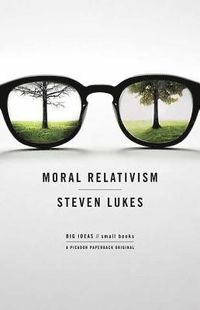
endast ny
Moral Relativism: Big Ideas/Small Books Upplaga 1
Moral relativism attracts and repels. What is defensible in it and what is to be rejected? Do we as human beings have no shared standards by which we can understand one another? Can we abstain from judging one another's practices? Do we truly have divergent views about what constitutes good and evil, virtue and vice, harm and welfare, dignity and humiliation, or is there some underlying commonality that trumps it all?
These questions turn up everywhere, from Montaigne's essay on cannibals, to the UN Declaration of Human Rights, to the debate over female genital mutilation. They become ever more urgent with the growth of mass immigration, the rise of religious extremism, the challenges of Islamist terrorism, the rise of identity politics, and the resentment at colonialism and the massive disparities of wealth and power between North and South. Are human rights and humanitarian interventions just the latest form of cultural imperialism? By what right do we judge particular practices as barbaric? Who are the real barbarians?
In this provocative new book, the distinguished social theorist Steven Lukes takes an incisive and enlightening look at these and other challenging questions and considers the very foundations of what we believe, why we believe it, and whether there is a profound discord between "us" and "them."
Upplaga: 1a upplagan
Utgiven: 2008
ISBN: 9780312427191
Förlag: St. Martins Press-3PL
Format: Häftad
Språk: Engelska
Sidor: 208 st
Moral relativism attracts and repels. What is defensible in it and what is to be rejected? Do we as human beings have no shared standards by which we can understand one another? Can we abstain from judging one another's practices? Do we truly have divergent views about what constitutes good and evil, virtue and vice, harm and welfare, dignity and humiliation, or is there some underlying commonality that trumps it all?
These questions turn up everywhere, from Montaigne's essay on cannibals, to the UN Declaration of Human Rights, to the debate over female genital mutilation. They become ever more urgent with the growth of mass immigration, the rise of religious extremism, the challenges of Islamist terrorism, the rise of identity politics, and the resentment at colonialism and the massive disparities of wealth and power between North and South. Are human rights and humanitarian interventions just the latest form of cultural imperialism? By what right do we judge particular practices as barbaric? Who are the real barbarians?
In this provocative new book, the distinguished social theorist Steven Lukes takes an incisive and enlightening look at these and other challenging questions and considers the very foundations of what we believe, why we believe it, and whether there is a profound discord between "us" and "them."
Ny bok
230 kr242 kr
5% studentrabatt med Studentapan
Begagnad bok (0 st)
Varje vecka tillkommer tusentals nya säljare. Bevaka boken så får du meddelande när den finns tillgänglig igen.



